For much of the presidential campaign, it has appeared that moral values issues would play only a small role in the November election. Indeed, at various points both Barack Obama and John McCain shied away from talking about abortion, same-sex marriage and other “culture war” issues. But the selection of Sarah Palin as the Republican Party’s vice presidential candidate and Catholic bishops’ criticism of Joe Biden’s comments on when life begins have increased the attention paid to culture war issues. If the candidates focus more on these issues, will it help or hurt them with voters? Will the national and global economic difficulties introduce new definitions of the culture war? Just a few weeks before Election Day, the Pew Forum invited two culture war experts and a group of leading journalists to explore these questions in depth.
Speakers:
Todd Gitlin, Professor of Journalism and Sociology, Columbia University
Yuval Levin, Hertog Fellow and Director of the Bioethics and American Democracy Program, Ethics and Public Policy Center
Moderator:
Luis Lugo, Director, Pew Forum on Religion & Public Life
Navigate this Transcript:
Gitlin on the history of American culture wars
Levin on cultural populism vs. economic populism
Levin on the McCain campaign’s approach to Obama
The culture war election vs. the economic election
Ironies of cultural populism
Redefining the culture wars
Who are the elites?
Event Transcript
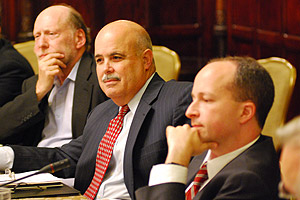 LUIS LUGO: Good afternoon to all of you, and thank you for joining us today. I’m Luis Lugo, director of the Pew Forum on Religion & Public Life, which is a project of the Pew Research Center. The Center, as many of you know, is a nonpartisan organization and does not take positions on issues or policy debates.
LUIS LUGO: Good afternoon to all of you, and thank you for joining us today. I’m Luis Lugo, director of the Pew Forum on Religion & Public Life, which is a project of the Pew Research Center. The Center, as many of you know, is a nonpartisan organization and does not take positions on issues or policy debates.
This luncheon is part of the Forum’s mission of bringing together journalists and policy leaders to discuss timely topics at the intersection of religion and public life. I’m pleased to welcome you today to a discussion on culture war issues and the presidential campaign.
According to a recent Forum survey, which you have in front of you as part of your packet, section three to be more precise, culture war issues such as abortion and gay marriage are not as important to voters this time around as those issues were in 2004. But they still matter, and they matter a lot, to important segments of the American electorate. At this point in the campaign, of course, it’s all Wall Street all the time. But sooner or later, whether before the election, maybe even tonight in the vice presidential debate, or after the new administration takes over, these issues are bound to resurface in a significant way.
To help us explore what role culture war issues might play on Election Day and beyond, we are delighted to have with us two very distinguished experts. You have a copy of their bios in front of you as part of that packet, so I will make my introduction very brief.
Todd Gitlin is professor of journalism and sociology at Columbia University, where he also oversees the Ph.D. program in communications. Professor Gitlin regularly contributes to TheNew York Times, the Los Angeles Times, TheWashington Post and other media outlets. He has written numerous books on mass media and politics and lectures on these topics in the United States and abroad.
Our other speaker, Yuval Levin, is the Hertog fellow and director of the Bioethics and American Democracy Program at the Ethics and Public Policy Center here in Washington. Prior to joining the center, he served as associate director of the Domestic Policy Council at the White House and before that, as executive director of the president’s Council on Bioethics, both in the Bush administration.
The Forum’s partners in this series are Mike Cromartie to my right and E.J. Dionne to my left. I’m glad that both of them could join us today. I think it was Mike’s turn to moderate. But obviously, we wanted to avoid any appearance of a conflict of interest or tilting it in one way or another. So Yuval, for you being here, we’ve got to knock Mike out of the picture for now. But they obviously are welcome to participate in the Q&A and add their views, not as impartial moderators, but sharing their own perspectives with us.
Now, this is meant to be a conversation. So we always ask our speakers to keep their formal remarks short, so we have plenty of time for your questions and comments. Before I turn to our experts, I’d like to bring a couple of things to your attention. First, on your tables, you have the rich packet of information that includes the survey that I mentioned. This survey is just about a month old, nicely bound thanks to our staff. And you also have candidate positions and other background information related to culture war issues. I’d also like to remind you that this meeting is on the record and is being taped. That’s because we like to post the written transcript very quickly on our website so others have a chance to benefit from the conversation. During the Q&As, we will ask that you please identify yourself and your organization before you ask your question or make your comment. Thanks.
Todd, I think by coin toss or however we determined it, you’re up first.
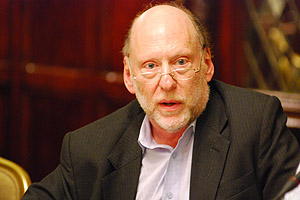
TODD GITLIN: Thanks a lot for bringing me down here. The question you and other organizers have posed is, will the culture war matter in November? When I was first invited, I thought about being cheeky and saying, can you doubt it? Now, I have to add here, my prediction record is clear. Generally no matter what the issue, if you bet against my side, you’ll take my cause to the cleaner’s. But this time, like a stopped clock, I was right, I guess. In any event, as you well know, a certain Sarah Palin zoomed into public view.
Here’s my outlook on the culture wars and their mattering. The culture wars matter in American politics because it’s the norm for them to matter. They always matter. They don’t always matter decisively, and the sides don’t always line up in the same way. In fact, the outcome of politics frequently hinges on who succeeds in defining what will be the sides this time. But the culture wars always matter because Americans vote not simply, and not even necessarily first, for what they want but for whom they want. And whom they want is a function, in part, of who they are and how they think of themselves – how they want to think of themselves. In a word, what kind of culture they embody. So a presidential system, in particular, brings this out in a deeply anti- or apolitical culture in which we live – appearances to the contrary notwithstanding – accentuates this tendency.
French philosopher Ernst Renan famously said that a nation was a daily plebiscite. In America, we have a quadrennial plebiscite: who are we? And that’s to be determined in a month. Remember that America was defined from the start as the fruit of an ideology, not a nationality. Therefore, America is particularly prone to culture wars. There is no American nationality. So the question of what holds the nation together, of who belongs here, of what this stands for, is a matter open to debate. America is a way of life, in other words, a culture. So culture wars are as American as egg foo yung and tacos.
In general, the culture war in its continuing incarnations is an ongoing fight, in my view, between the enlightenment and its enemies. This is not always and not mainly, actually, a war between religion and irreligion. But it is always a fight between a certain order and a certain disorder; between warring authorities and warring values. In the 17th century – to just hop, skip and jump through a few examples – it was a fight between the theocratic totalists of Massachusetts and the tolerance politics of Roger Williams – all Christians, mind you, all devout Christians.
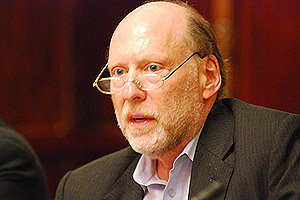
From 1776 through ’83, it was a fight between revolutionaries who were in alliance of deist enlightenment intellectuals and religion awakeners, adding up in total to maybe two-thirds of the population. And those other people, the Tories, numbered probably one-third of the population of the time. The issues change. The structure of resentment does not change. The structure is essentially bipolar: not exactly between tradition and modernity – which is the way it’s usually depicted – but between two traditions. In shorthand, though, it is generally understood as a fight between forces of modernization and forces of tradition.
In the 20th century, it has often been a fight between – surprise – small towns and cosmopolitan centers, not necessarily literally. For example, the forces of cosmopolitanism in the ’90s were lead by a certain guy from Hope, Arkansas. But in 1925, it was between Dayton, Tennessee, and on the other side, the Chicago of Clarence Darrow and the Baltimore of H.L. Mencken. In 1974, the fight over school textbooks in Kanawha County, West Virginia, where political fundamentalists won; it pitted them against the cosmopolitan modernizers in what was – has been called the pivotal moment in the right wing recovery movement.
The 1960s, where our contemporary culture war vocabulary comes from, intensified culture war cleavages. There were three revolts in progress that tended to line up or to map onto each other: the revolution in rights for African-Americans, the revolution in rights for women and the revolt against the Vietnam War – which an aspect of maybe we could call it, the college town versus the non-college town. I want to appreciate the depth of these superimposed cleavages. Here are some poll items I got recently from my colleague Robert Shapiro in the Political Science department at Columbia.
May/June 1961, here’s a poll question: “Have you heard or read anything about the freedom rides taking place in the South?” Sixty-three percent said yes. They were then asked: “Do you approve or disapprove of what the freedom riders are doing?” Disapprove, 64 percent. “Do you feel demonstrations by negroes have helped more or hurt more the advancement of negro rights?” The percentage who said hurt more: 1963, 45 percent; 1965, 58 percent; September 1966, 80 percent. Consider for a moment that 1965 figure. This is the canonical moment of civil rights activism: when Martin Luther King is retroactively sanctified. He is identified properly with the great voting rights march in Selma. Selma march: 58 percent said demonstrations by negroes – not riots – hurt more the advancement of negro rights.
Here’s another one. “Suppose all other methods have failed and the person decides to try to stop the government from going about its usual activities with sit-ins, mass meetings, demonstrations and things like that. Would you approve of that, disapprove or would it depend on the circumstances?” November 1968: disapprove, 74 percent. That’s in the month that Richard Nixon was elected. Now, my view is that each change in the cultural status quo results in or is the product of a culture war. Six years after Barack Obama Sr. and Stanley Ann Dunham married in Hawaii, U.S. News railed against the Supreme Court interracial marriage decision in Loving v. Virginia, 1967. I owe that discovery to historian Rick Perlstein. The South Carolina state constitution of 1895 prohibited, and I quote, “marriage of a white person with a negro or mulatto or a person who shall have one-eighth of more of negro blood,” close quote. That provision was not repealed until 1998. Culture wars.
In the early 1960s, after a period of removal from the public domain, evangelicals began to move into politics in order to beat back what they saw as the expulsion of God from the public domain – and the school prayer decision and others of the Warren court. Later in the decade, there was “white flight” from schools that had been ordered to integrate. This gave an institutional base, white-only schools, to what was on its way to becoming Jerry Falwell’s Moral Majority.
The feminist movement cracked open another fault line. This isn’t all about race. In the ’70s, the abortion war became a surrogate for the feminist-anti-feminist war. My former colleague Kristen Luker’s research on pro-choice and anti-abortion activists demonstrated that the fight over abortion mapped rather neatly onto the fight over where a woman was getting her identity: whether in the family or in the public world.
Now, I think finally – don’t worry, I’m almost done – what gives shape to the culture wars of the last half century is not only ideological cleavages about ways of life but also a party decision. Beginning in the late 1960s, the Republican Party became skilled as the party of resentment: skilled at the mining of nuggets in the form of wedges. And today, it also benefits – or I should say, it has, perhaps, for many years, benefited – from mapping foreign policy stances onto other cleavages in turn. So American politics begins to look like the fight between – I’ll call it here – the belligerent, masculine complex of John McCain and Teddy Roosevelt, his hero, and the – we’ll call it, invidiously, maybe – the feminized, thoughtful complex embodied, at this point, by Barack Obama.
But again, the structure, the body if you will, remains the same even as the issues which are the cells change. Culture war is a fixture. So, to the question of how the culture wars will matter this time. Well, we have all the usual dimensions: abortion, gay marriage. We have, I think, an accentuation of the city versus country theme, which is a perennial. We have Barack Obama, of Honolulu, New York, Cambridge and Chicago versus John McCain of Sedona and Sarah Palin of Wasilla. Obviously, the impact of all of these will be muted by the financial and economic crisis to the great benefit of Sen. Obama and the chagrin of Sen. McCain.
But of course, even the financial crises are colored by imagery and values. Think about the metaphorical cleavage that’s cropped up so vigorously in the last couple of weeks – but so intensely that it seems as if it’s always been there: Main Street versus Wall Street. There’s a full-page ad in the Times this morning from New York Life: “We’re Main Street, not Wall Street.” I thought when I read this: Roll over Sinclair Lewis. (Laughter.) The legacy of the culture war, in other words, is well nigh inescapable – whatever’s the ostensible object of attention.
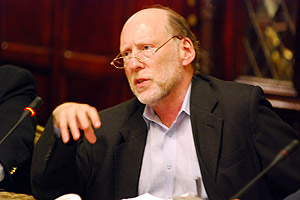
I would add only one thing that is a drastically under-publicized dimension of the culture wars this time around. And this is the issue of vote suppression: voter purges, disenfranchisement of legal immigrants, the maintenance of felon lists, the Indiana Supreme Court decision that places the burden of proof on voters to offer ID in the absence of any showing of significant vote fraud and so on. The Brennan Center at NYU, just this week, came out with a round-up report on voter purges that is well worth looking at. Now, I ask you to keep in mind that vote suppression is also, in an interesting way, a battlefield in the culture war between a political culture of inclusion and a political culture of exclusion.
And the question that that issue joins is the perennial question: What kind of a country is this? What is our moral core? Who deserves standing? And attached to that, which elites deserve power and how do you get into one? The populism of today’s right is very far from the populism of the 1890s: the regulate- the-railroad, cheap-money, free-silver, small-farmer’s populism – that in some of its moments, tried to cross the color line that was hardening in the South. Today’s culture war pits what Saul Alinsky called the have-a-little-want-more people against those who have less. And the party of resentment, obviously, has capitalized on that and is devoted to it and I think requires it. This faux populism – the populism of Lou Dobbs and Bill O’Reilly and Sean Hannity and company – is a populism whose hallmark is exclusion. It entails, among other things, reduction of the franchise. What is this if not a culture war between two stories of America: of who is properly an American and what the country stands for. Is it an embodiment of democratic possibility or a rollback?
Finally, finally, the strange difference – and this requires much more thought than I have been able to devote to it. What is very peculiar and interesting is that in one of its dimensions, the current culture war is a revolt of the masses. This is a phenomenon that would have horrified and perhaps amused, if he had any sense of humor, James Madison. He was the slave-owning elitist – to use a word I don’t normally use but in this case, it is strictly true – whose dread of the masses, which was widely shared by the likes of his neighbor, Thomas Jefferson, led to a Constitution that dispersed power and made it very difficult for government to govern. Perhaps, the ongoing collision between the open door of rights and the closing of doors against those demanding more rights is the battleground for the next engagement in our continuing culture war, period.
LUGO: Thank you very much. Yuval.
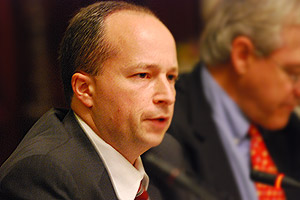
YUVAL LEVIN: Thank you very much. Thanks for having me; and I thank Todd, too, for that characteristically insightful, illuminating presentation. I’ll start in a similar place because I agree with an important beginning premise that Todd laid: that the culture war in our politics is not fundamentally about issues, discrete issues. If it were, this probably wouldn’t be much of a culture war election because neither candidate is particularly interested in what we think of as the culture war issues – nor has been in the past few years. Neither of them is an obvious player in those issues in Washington. Barack Obama was, to some extent in Illinois, but hasn’t been since.
So I agree that the culture war on our politics is really a – a set of opposing attitudes and dispositions. But I don’t quite – I wouldn’t describe it in the same way that Todd did. It seems to me that the culture war actually takes place within what Todd described as the party of resentment. I think that both parties in our politics, both sides in our politics, actually want to be the party of resentment. And you know, no one wants to be the elite in American politics; they just have two very different ways of understanding what elite means and what there is to resent. And the culture war is a war of two populisms, what we might call in very broad terms, cultural populism and economic populism. For that reason, I think that this election is definitely, and has been and will be, a culture war election – because in fact, in this particular election more than most, we see the war of cultural populism defining the two candidates.
The Republicans have nominated a candidate who is a populist of a sort that they really haven’t seen in a very long time. He’s a populist not as much on cultural terms, in fact, as on what we normally think of as economic populism, at least in attitude, in disposition. While the Democrats have nominated a candidate who is – I would argue, and I will try to lay this out now – more of a cultural elitist than we’ve actually seen from them in the past. I think both of these will probably give you some pause so I want to lay them out.
Certainly, many people would argue that it’s silly to call Barack Obama an elitist. He grew up relatively poor and he was even once on food stamps. He didn’t come from a prominent family; he made his own way in the world; he made his own name. And John McCain is the son of a fairly wealthy family of kind of American military aristocracy. He married an heiress; I don’t know where these senators find these heiresses these days, but somehow they do (laughter). In that objection to calling Obama an elitist, in a nutshell, we have a picture of why the Democrats have so often done so poorly in Middle America and have handled so clumsily the question of cultural populism. What we have in the objection is a confusion of cultural and economic populism, a confusion of cultural identity with class identity.
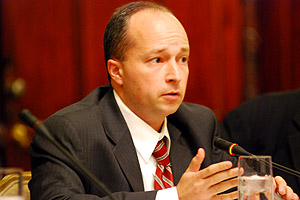
I think it’s fair to say that these two are quite distinct in our politics; the Republicans have generally been very good at cultural populism and the Democrats at economic populism. In normal times, the Republicans are the kind of traditional values, unabashedly patriotic, anti-cosmopolitan, non-nuance sort of Joe Six-pack Americans. The Democrats are much better, as I say, at economic populism. They’re more naturally the sort of righteously indignant, out for fairness, anti-corporatist, people against the powerful, and defender-of-the-little-guy type. And the left is not generally good at cultural populism; the right is not generally good at economic populism.
When these two things are combined into one, they can be very powerful. I don’t think we’ve really seen it happen since Ross Perot in 1992. Ross Perot – it’s amazing to think now, won 20 percent of the vote in a presidential election when he was basically insane and – (laughter) – he overcame that – what would normally be a pretty serious disability – (laughter) – by being a very effective populist, a true populist. I don’t think we’ve seen that since and we don’t see that much. We haven’t seen that much in American history.
In normal times, the two parties divide populism into these two portions; and in America, unlike in Europe, cultural populism has generally been a lot more powerful than economic populism. Americans don’t resent success; they don’t assume that corruption is the only way to the top, but they do resent arrogance and especially intellectual arrogance. And so while economic populism can certainly be very potent, it is almost never a match for cultural populism. And the Republicans generally do well – better than the Democrats on the elitist versus populist question. They win that game almost every time – doesn’t mean they always win elections, but it helps them.
It doesn’t really matter, I think, who’s actually more rich and who’s less rich. The guy that asks for a fancy European cheese on his cheese steak is the elitist. We’ve seen that especially in the last two elections. You can actually literally have a guy whose parents are both descended from Mayflower pilgrims, whose family has been wealthy and prominent since before American independence, whose grandfather was a senator, whose father was a president. And he is the Joe Six-pack in the election, and easily so, almost naturally so. Again, the cultural question so often and so easily overrides the question of economic populism.
It’s impossible for me to overstate how badly the Democrats have handled this problem. The nation’s cultural elite is, of course, very liberal. And in the minds of many Americans, certain elements of the left-wing worldview have just become synonymous with cultural elitism. But the Democrats have not helped themselves on this front. I think Bill Clinton was an exception – and very self-consciously an exception – but Al Gore and John Kerry and before that, too. Their candidates for president have just been walking disasters on this front. And I would actually argue that Barack Obama, in some important ways, has been even worse.
He literally said, out loud, where people can hear him, that he thinks that people in small-town Pennsylvania cling to God and guns because they’re bitter – an unbelievable statement. It’s what the cultural populists think that people in San Francisco think about them. And he said it. He said in a speech that Americans just drive big cars and eat what they want and set their thermostats to 72 degrees and expect that other countries won’t say anything about it. He said in a campaign event that he’s embarrassed that Americans don’t speak more languages. It would’ve been very hard for – you can’t even imagine John Kerry saying these things. He was much more naturally thought of as a cultural elitist. I think Obama is a walking, talking example of the way in which economic and cultural populism are not the same thing.
He is a cultural elitist and a classic representative of the cultural elite. And yes, his mother was on food stamps. She was on food stamps at a time when she was a graduate student getting a Ph.D. in anthropology. His elitism didn’t come out of nowhere. And if you read his book, his first book, which is really a wonderful book, you get the picture of where he came from. He came from a loving family that was on the left fringes of American cultural politics. And he stayed there. He stayed there through college and as a community organizer and in Chicago politics and since then. It’s not the worst thing in the world to be; but it is what Barack Obama really is, it seems to me.
And Obama has been badly hurt by this in certain ways. I mean, he almost lost the primaries when Hillary Clinton discovered this weakness of his and swiftly transformed herself into some kind of a beer-chugging, smoking, bowling steelworker – very effectively. And she won just about every significant primary after she started doing that. She almost beat him because of it. It’s perfectly imaginable that the last month of this election will be a little bit like the last few months of the primaries were for Obama – where this is made an important issue by his opponent and where it hurts him. I don’t think it’ll be unfair to do that, and I don’t think it’s hard to imagine the McCain campaign trying to do that.
So that’s the sense in which I’m saying that Obama may well be the most elitist candidate that the Democrats have nominated: a cultural elitist in the extreme on the one hand and also someone who finds it a little bit difficult to actually turn himself into an economic populist. He tries and he does do it, but it doesn’t come quite as naturally for him.
John McCain on the other hand is, I would say, the most populist Republican that we’ve seen in a very long time. He is, by his nature and his disposition, an economic populist as well a cultural one – and the way that Republicans usually aren’t. And I say by nature and disposition because it’s not a matter of issue-by-issue analysis of his actual views on economics that he looks a populist but as a matter of character and presentation – which I agree with Todd, is more important in many ways.
McCain is most animated, most alive when he talks about cleaning up corruption, when he talks about fighting abuses of power and excess. He’s a natural anti-corporatist even if he’s not a substantive anti-corporatist. He has the disposition and the instincts and that kind of ready Tom-Joe moralism of a union agitator. And his cultural populism actually takes a similar spirit: it’s patriotism more than it is religious piety. It’s service more than tradition. It’s honor more than it’s family values. And here again, his populism is more like a kind of Midwestern Catholic than it is Southern evangelical. In that sense, also, I think it’s more populist.
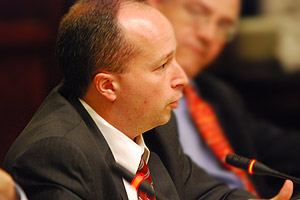
So McCain, in this regard, is a very unusual Republican, and I think his campaign realized this. They realized also that they had an opening, given whom they were running against. And frankly, they realized that McCain really couldn’t be anything else than what he is. He’s a terrible pretender. And so they have tried to run on this attempt to play both sides of the populist card. They seem to have in mind, as I see it, a kind of three-step approach to Obama. In general terms: cultural populism, first; sort of economic populism, second; and cultural populism, again.
So beginning in the late spring and early summer, after it was clear that they’d be running against Obama, they began to attack his strength, his ability to draw crowds and make a stirring speech. And they attacked it precisely on populist grounds: they called him a celebrity, they called him a creature of Hollywood, a pompous pop star. And he helped them, of course, by going on a European tour and all that. And it also helped them make the case against his lack of experience – his lack of a résumé. It was all wrapped up in what was really a very populist message, and I think a pretty effective one.
What they tried to make the next step was to begin in their convention to focus a bit on a certain sort of John McCain economic populism. They portrayed McCain as a maverick, as an opponent of corruption and excess, a reformer who kind of shakes up the big boys in the back rooms. And McCain began to make the case for himself in this way: the most upfront way that he had done in the campaign up to that point, in his convention speech. The third stage – which I’m only postulating and it’s still to come and we don’t know what the final stage of this election will look like – could well be a return to cultural populism. Attack Barack Obama not on his strength, but on his weakness: that he has a very liberal voting record, and one that in some important ways, on cultural questions, will make him seem very different from many American voters – especially in the states that count most.
The Sarah Palin pick suited this approach very well. The basic logic of it was to complement McCain’s reputation for reform, for anti-corruption and for a kind of anti-pork. Palin is in fact one of the very few Republican office-holders in America, maybe the only one, who’s anything at all like John McCain in this respect. You can see what he would’ve liked in her attitude and in her record. Palin also contributed to the cultural populism of the campaign in ways that I think went far beyond what the McCain campaign could have possibly expected. Her nomination certainly energized cultural conservatives who saw her as coming from where they were coming from. And that, the campaign certainly did expect.
But even more than that, much more than that, her nomination sent the cultural elite reeling into a kind of uncontrolled fit. The first few days after the announcement of Palin, I really think are going to look like a kind of dark blot on the history of American journalism. Reporters became, more explicitly than we’re used to seeing them, direct conduits for some of the darkest and ugliest features of our cultural elite. And for a while there, really, every semblance of ethics was probably left at the door. There were rumors about her family and personal history swirling around on mainstream news shows, on the front pages of all the major newspapers.
There was a picture of her as a religious zealot, that she was opposed to contraception, to sex-ed, to evolution. She wanted to teach creationism in the schools. She was a book-banner. She wanted to put women in jail to end abortion. None of these things are true – none of them. And it would’ve been very easy to point that out with even a semblance of actual journalism, but it didn’t happen. And what we saw instead was something much more interesting: a kind of temporary breakdown of the cultural left. I think it did largely pass; but in the process, it cemented a connection between Palin and the cultural right that very powerfully strengthened McCain’s campaign for a while at a time when they really needed it.
I think that the turn they were trying to make to economic populism, to his version of it, hasn’t really gone all that well. The economic crisis that we’re in, which might, in theory, have advanced his case – mostly in practice – has put Republicans on the defensive. McCain’s own flailing performance at the beginning of it hurt his image too. The actual substance of his economic populism is probably inadequate for the task. It’s really mostly atmospheric. There’s a kind of gnashing of teeth, but there’s not actually a middle-class agenda for the most part under there. At least they haven’t made it clear. I do think that anger helps him in this period, that he would’ve been worse off if he had Mitt Romney’s CEO confidence or even Barack Obama’s very cold reserve. But it hasn’t been enough to make him the real economic populist in the race.
But as I say, I do think there will be a further turn to a cultural populism that can be pretty powerful. There’s quite a story to tell about Obama. There’s not been a lot of journalism done on Obama so a lot of it will be new to voters. And it could be quite powerful. Will it be enough? Obviously, that remains to be seen. Present indications really aren’t all that terribly great for McCain. This is a very Democratic year and any Republican candidate would have had to sail against some stiff winds. But to the extent that cultural issues have played a role, I think they’ve helped McCain. I think they’ve probably helped him significantly and could well help him a lot more. And what I’m trying to suggest here is a sort of general picture of why. But obviously, I’m happy to talk about particular issues in the Q&A as we go.
LUGO: Thank you. Well, these two presentations have been so tame and reserved that I just – I wonder if there are any questions or comments from you folks out there. E.J., we’ll have you go first and then Mike, if you want to say something; and then we’ll open it to the rest of you.
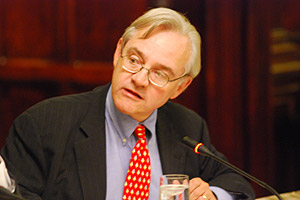
E.J. DIONNE, THE WASHINGTON POST: First, I want to say that I am a huge fan of both Todd and Yuval. For me, this is like being in a baseball practice with Red Sox players Dustin Pedroia and John Lester – (laughter). So I want to thank you very much, and you know where my loyalties lie from that. Two small points and then one question by way of dissent. Small points – I agree heartily with Yuval that Kerry should have taken the Cheez Whiz – (laughter) – and I think McCain is having trouble as an economic populist because he isn’t one. I think he’s more Andrew Mellon and Phil Gramm in a Huey Long costume, and he’s had trouble making that work. And that’s a light point, but I actually think it’s a substantive point for the long haul.
I guess I wanted to dissent and say that, in fact, while we always have a culture war to one degree or another, there are signs that it is actually waning in this campaign. There are many different ways of looking at the culture war. My way of looking at it, which is closer, say, to Alan Wolfe’s or to James Hunter’s: there is a culture war between the 10 or 15 percent of us who are most culturally and religiously conservative and the 10 or 15 percent of us who are most secular and culturally liberal. But that there is a vast middle ground where people have complicated views: conservative on some things or at some times like when their kids are teenagers and liberal on other things and at other times.
When issues, particularly economic issues, present themselves, the culture war recedes. I think that’s what’s happening now just as it happened between 1928 and 1932. In 1928, it was a culture war election with prohibition announcements, Catholicism; 1932 was an economic election. And as evidence of this, I think Sarah Palin is not in trouble because her cultural views offend the left. Sarah Palin is in trouble – and I bow low before Kathleen Parker as I say this – she is in trouble with great respect – I’m the last friend Kathleen Parker needs right now, but I admire her. (Laughter.)
But I think Sarah Palin is not in trouble because of her cultural views. She’s in trouble because of her lack of substantive knowledge and grounding. And she’s in trouble with the middle, not the left. And so I think this may be the year. Yes, there will be some voting along cultural lines; yes, right-to-lifers still will vote Republican; yes, white evangelical Christians will remain Republican for a whole variety of reasons. But this just doesn’t feel like a culture war fight to me unless Yuval is right, and McCain somehow pulls the culture war rabbit out of the hat between now and Election Day. I’m just curious for your reaction.
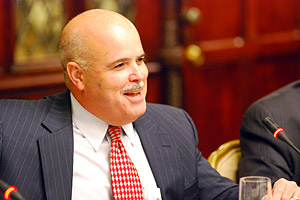
LUGO: Very helpful. Todd, why don’t we begin with you on that one as to, you know, is there a waning of a culture war? That sounds like he’s disagreeing with your view on the presence of the culture war.
GITLIN: Well, I mean, on what the issues that have come to be trademarked as culture war issues, I certainly agree. However, I think that culture war is being transfigured. Let me throw in another dimension of culture war that I think we’ve tip-toed around the edge of. It has to do with this vexed term, elitist. It is I think one of the viler and more deceptive terms floating around American politics for the last 20 years or so.
I think this is a very confusing term. And it’s a confusing term sometimes in American populism. It happened that some of the 1890s farmers who hated the gold bugs and wanted cheap money also hated fancy-pants northeastern top-hat-wearing folks whom they identified as possibly Jewish, but in any case, Wall Streeters and exploiters of them.
There is this very disconcerting conjunction in the history of the American culture war between moneyed elites and knowledge. If you dislike one, you must dislike the other. If you are William Jennings Bryan and you despise the cross of gold, you must also be a biblical literalist. Now, here’s the promise of this moment. The promise of this moment is that, for eight years, the president of the United States has been a man who not only effected a populism to which he was not entitled substantively, but is also a raving ignoramus and a contemptuous ignoramus. He is a man who famously is indifferent to argument, impervious to evidence, uninterested, uncurious and all the rest of it. Don’t get me started.
In that setting, the Sarah Palin affair makes more sense because this is not a great time for an ignoramus to step into the spotlight of world power, which is what we’re talking about – world power. It was one thing for George Bush never to have traveled to Europe – not much made of it in the 2000 election. It did come up. But it’s something else now – given what the world is, given what we all know the world is.
Now, I think Obama is an elite individual, but he is not an elitist. I hope this distinction can be made clear. When he says, it’s a shame, disgrace – what was the word he used? – that Americans not having more than one language.
LEVIN: Yeah, he was embarrassed.
GITLIN: Okay, he’s embarrassed. He’s right. And I’m ready to go down fighting with those who think it’s a disgrace. Here’s the difference between elite and elitist. Obama stands for an elite which anyone can get into, but you have to work your way into it. It’s not hereditary. It’s not George H.W. Bush’s elite. It’s not Prescott Bush et al’s elite. It’s an elite that anybody can work his way into.
This is an American elite. This is an elite – you know, the Brits had a similar idea. You know, let’s send a few working-class boys and girls to Oxford and Cambridge; that will replenish the elite. Well, this is also an idea. It’s a grown-up idea about what it takes to run modern institutions. It takes knowledge. And if Obama can actually succeed in illustrating that he stands for the mobilization of knowledge in behalf of popular good, I think this would be an enormous achievement. Seriously, America has to outgrow this childish negation of reason. And that’s why it is the party of enlightenment.
There’s a lot more to be said about all of this right now. To connect it back to what Yuval said, I don’t think Obama is an elitist at all, not in style. He is actually, you know, he’s thoughtful, reasonable, professorial. The complaint about him from the left is that he’s too damn professorial. When Rick Warren asks him a question about abortion, he says, well, you could argue that. When I heard those words “you could argue that,” I thought, man does this guy not want to play American politics.
The people don’t talk like that in American politics. They talk like that at the university. So I think he actually represents something really interesting and, at the risk of hyperbole here, I would say we have a precedent in the history of American presidential politics for somebody who exhibits elite quality and is not elitist. And, believe it or not, he is the past president from Illinois, Abe Lincoln. He’s a guy who grows up in a log cabin, learns to read with Shakespeare and the Bible, writes the English language the way no one else in American history has ever written it, could not have been smarter and so on.
Was he accused of being an elitist in his time? I don’t know. My historical knowledge isn’t deep enough to know.
JAMIE STIEHM, HUFFINGTON POST: Yes.
DIONNE: Yeah, he was a very odd kind of Christian, certainly in the second inaugural.
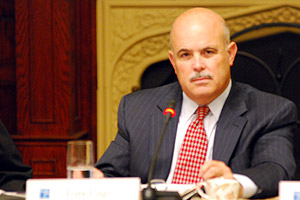
LUGO: Okay, Yuval. It sounds like you need to respond to two people, not just E.J.
LEVIN: Okay. I’ll begin with E.J. I actually don’t disagree that the culture war occurs between two relatively narrow slivers of our population. But when presidential elections are as close as they have been for a while now – and I don’t just mean the last two – that narrow sliver matters a lot. And it also happens to be that these are folks who live in states that matter especially a lot. Fifteen percent is quite a lot when the election comes down to 27 people and even when it comes down, as 2004 did, to one state.
So I think the culture war matters more than it ought to on its own terms because of the way that our political system is set up, because of the way you have to win an election. So I do agree with that. I think it’s an important part of American culture, generally. But I don’t suggest that every American is on one side or the other. I certainly agree with you that that’s not the case.
Regarding Palin’s trouble, what I argued was not that Palin’s in trouble because she was attacked by the left, but, in fact, that because she was attacked by the left, she is much more of a populist figure than she would be on her own terms. And the attack that emerged against her at the beginning of – immediately following the announcement of her selection certainly helped cement her connection with what we would think of as the kind of cultural populist wing of the Republican Party. Whether she’s in trouble now and, if so, for what reason, I think is another question.
Todd, I guess I would define elitists as just simply the people that the populists hate. (Laughter.) And it’s a smaller definition than the one you’re disagreeing with. I agree with you that the term can easily be misused. But I think the elitists are the target of populist resentment. And that is one of the reasons why cultural elitism is more powerful than economic elitism in America: because it’s a little bit easier to resent a certain sort of intellectual arrogance than it is to resent economic success in our kind of culture.
First of all, I disagree wholeheartedly with the way that you describe President Bush. I’ve spent a lot of time with him and I don’t see him as someone who lacks curiosity or who doesn’t take advice or who doesn’t ask questions. I think you couldn’t possibly believe that if you spent time with him, or if you saw him in action. You know, that’s going to be a he-said-he said situation, but I certainly strongly disagree with that description of him.
I think, more importantly, is the question of knowledge – of whether the elite is who is suited to govern. Obviously, elitism has a rich tradition in conservatism. If we say that conservatism began with Edmund Burke, then it began as an elitist approach to governing. Burke argued that the elite in his day were formed in a way that made them especially prudent and so especially able to govern.
If that were the case now, then I think that there would be a lot more conservative elitists. But I think the ways of gaining and keeping elite credentials in our society and in our time do not lend themselves to producing prudent people – that is, people who govern in a kind of sensible, level-headed way. There are other ways of making prudent people, but our cultural elite is not well-suited to govern. I don’t know that you would disagree with that.
I wouldn’t quite side with William F. Buckley that you’d rather be ruled by the people, by a random selection from the phonebook than the faculty of Harvard. But I don’t think any of us would want to be ruled by the faculty of Harvard, and I don’t think that we’d be wrong to reject them as a governing class. Our cultural elite is not an adequate governing elite. That means that we do have to look for other kinds of criteria, for other kinds of certification of the sort of prudence it takes. And that ranges from life experience to substantive experience to judgment and character. It makes it harder.
You don’t simply have a process of certifying an elite that’s suited to govern. And I think that makes it difficult for conservatives to be Edmund Burke-type elitists because we just don’t have the elite that he had to work with.
GITLIN: Burke presupposed an agrarian, land-owning elite; America’s never had it. So that’s a moot question. Just simply on the issue of Palin. Palin was named on a Friday, I believe, and she gave her speech – was it Tuesday or Wednesday?
UNIDENTIFIED: Wednesday.
GITLIN: Before any mobilization from the left or mainstream media took place, she – when people were still Googling her to try to figure out who she was – she gave a culture war speech. She attacked the eastern cosmopolitans. She started it.
LEVIN: I think those few days before her speech were definitely not free of culture war attacks on Sarah Palin. I mean, that’s exactly what happened in that period between the announcement of her selection and the speech that she gave.
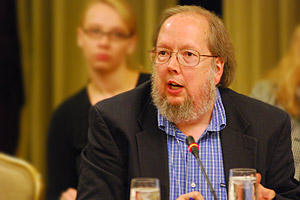
TERRY MATTINGLY, SCRIPPS HOWARD NEWS SERVICE: Years ago, in his famous column, “Is the Pope Catholic?” Bill Keller of the New York Times, said that in the end, he thought that America’s divisions essentially come down to the sexual revolution. Maureen Dowd said the right is trying to repeal Woodstock. I’m curious to know if any of you thinks that the kind of politics of religion and sex are going to show up in a big way in the next month.
GITLIN: McCain played it once, you remember, early on in the Woodstock flap when Hillary Clinton had supported a million-dollar earmark for a Woodstock museum. And McCain said to a Republican rally, I think it was: I heard it was a great cultural and pharmaceutical event. I couldn’t be there; I was tied up at the time.
Not a theme – actually a more artful way of playing the POW card than anything he’s come up with since. I think it’s too late for that because the banks are slamming shut, so I don’t think this is the time for him to reignite that flame.
But if an opportunity presents itself – I mean, if he could somehow find out that Obama’s mother was actually a member of SDS or something, or a flag-burner, yeah it might well be useful – not major.
LUGO: Yuval, you said you were expecting a turn to cultural politics in the last month. What about Terry’s question specifically?
LEVIN: Well, I don’t know that it would be necessarily about religion and the sexual revolution. I mean, McCain is just not comfortable with those kinds of issues. It’s not what moves him. It’s not what he thinks is the most important thing.
I do think we may see a more forthright discussion of Obama’s record on abortion as part of a kind of turn at the end here. And Obama really does have an amazingly radical record on abortion, you know, in part just because of where he found himself. I mean, he was the chairman of the health committee in the Illinois Senate at the time that the Democrats took over. And so, everything they did was done under his name. And it is an amazingly radical record. I mean, he’s certainly to the left of everyone else in the U.S. Congress on the abortion question. I can’t imagine that we’re going to get to Election Day without that becoming better known and understood.
You know, McCain hates talking about religion, hates it – not just in public speeches but in private. He just can’t stand it. He thinks it’s just not something you talk about. And I don’t think that he will do that. But you never know. And it may be that it’s done in other ways and through surrogates. I don’t expect this to be a kind of God and sexual revolution period, even if there is a turn to cultural issues. But I’m not sure.
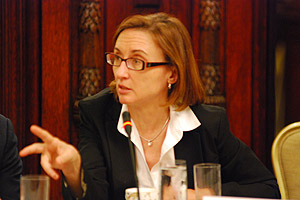
JACQUI SALMON, THEWASHINGTON POST: What impact do you think the culture wars – the type of culture wars that Sarah Palin represents – will have on tonight’s debate? Will she be trying to use that to overcome her lack of experience, some of her stumbling performances?
LEVIN: Sure. I think to some extent she might try to use it. I think she’ll probably try to present herself – as she, I think, has already said – as a kind of Joe Six-pack in the election. I think she said that in an interview the other day; that will probably annoy Joe Biden somewhat, since that’s his shtick. But I think she’ll try that to an extent. I think she may mention Obama’s record on abortion – which John McCain has not done much of and which she actually has a bit again just in the past week. This suggests it might be part of their debate prep.
But I don’t know how explicitly she would try to do this. Obviously, everything would depend on exactly what comes up in the debate. But it’s not out of the question. I mean, she knows that she can present herself as a middle-class mom, whereas everybody else in the election professionally talks about the middle class. So I wouldn’t be surprised if she tried to make something of it.
LUGO: What about Biden, Todd? Would he be hurt or helped to engage these issues in the debate tonight?
GITLIN: Oh, I think he’s hurt if he keeps the spotlight off McCain. I think he had better watch himself.
Just one thing about Palin. I think having painted herself and been painted into the corner of being a candidate of the right wing, the cultural right wing of the party, she can only lose if she stays there. So she has to try to recoup by making – that is to say by emphasizing – that she’s okay with contraception and that sort of thing.

SALLY QUINN, THEWASHINGTON POST-NEWSWEEK’S “ON FAITH”: I find this really fascinating, the whole idea of the elitist versus the populist. And particularly because of the irony of it that McCain is a populist when he can’t remember how many houses he has.
And actually, I saw him this morning on Morning Joe. The last question was what baseball team are you going to vote on? And he said, well, you know, I’ll probably vote on such and such. But I’m not very good at this, which is why I’m not a rich man. (Chuckles.) Nobody blinked. But it just blew my mind when he said that.
And then, Sarah Palin, who in the last Pew lunch we had, one of the statistics that you all gave us was – I think it was 57 percent of evangelicals believed that a mother should not work outside of the home. And 52 or 3 percent of Republicans believe a mother should not work outside of the home.* And I find this whole issue really interesting. It is the, quote, “the left wing, liberal, elite media” who have actually questioned the fact that this is a woman who has five children, a 17-year-old pregnant child who is not married and a new Down’s syndrome baby.
I did write about this and I got a letter from a woman who was a friend of hers saying: You know, don’t you realize that Down’s syndrome babies are the easiest to raise because they don’t walk until they’re two and a half, so they don’t really need that much care in the beginning?
It was so shocking, I couldn’t believe it. But I find this really interesting that the evangelicals and the right wing would be that supportive of her given the incredible responsibility she has with her family and given their views of where women should be.
LUGO: Interesting. Well, I’d like for both of them to comment. One is on precisely the interesting twist that members of the press and others have raised the issue, Todd. You would expect based on public opinion polling that that would be the primary concern of social conservatives. In fact, they have not been the ones to raise the issue. And then, on precisely why they haven’t, why is that the case? But first on the first part of her statement?
GITLIN: Well, this is interesting. I mean, this is a case where you need some hard-headed research. My impression is that this has been some sort of kryptonite issue for many in the media who fear it would rebound badly – boomerang on them if they did dwell on her family. And you know, I think that’s a difficult issue to take on.
But I think you’re dead on about the peculiarity in this position. Years ago, Phyllis Schlafly, who has a significant number of children – I can’t remember how many – and of course was always crusading that women should be at home. She was always running around the country giving 200 lectures a year on this subject. And neither could I ever understand why this wasn’t the disqualification. But I suppose people in politics make allowances for discrepancies between personal life and public conviction. I don’t think it ever damaged Franklin Roosevelt that he was a landowner in the eyes of his supporters. I don’t think that was – I don’t even know that that was a political issue in his time. There were those who thought he was secretly a Jew. But he wasn’t accused of being a patroon.
LUGO: Interesting. Are social conservatives making some exceptions here, Yuval?
LEVIN: Well, I think it is true that you find in most polls either a small majority or a plurality of social conservatives think that women should stay home. Most of those, by the way, are women who think that. By far, the vast majority of those are women. But it’s not – that doesn’t mean that their attitude towards women who work is that they shouldn’t be working. It’s a question about what kind of choice you would make. It’s a question about what kind of choice you might think is best. It doesn’t mean that you look at women who work – that you reject them and you think they shouldn’t play a part in society.
Certainly, I would add, Sarah Palin has never been one to say that women should stay home. I mean, she’s been a working woman since before she was married, throughout the entire time she was married. And she even talks about herself as a feminist. She talks about Title IX, which gives people the creeps where I sit. But she does present herself as following in a kind of tradition of feminism. And so, I don’t think it’s hypocritical for her. Whether it’s hypocritical for some voters – as you say – people look at politics a little differently than they look simply at personal life. And people always make allowances in general. You know, you look at each situation sort of prudentially on its own terms.
I think to the question of whether there is an irony in John McCain being wealthy but Barack Obama being called an elitist, as I said in the beginning of my remarks before, I think that there is a big difference between cultural and economic elitism. And it’s a difference that people understand very easily and very readily. And there are a lot of rich populists and there are a lot of less wealthy cultural elitists. And that didn’t start in this election and it certainly won’t end in this election.
QUINN: I’d just follow up with one thing. The abortion issue also interests me. It seemed to me that particularly in the convention that Sarah Palin stayed away from that issue because, of course, the majority of people in this country are pro-choice. And she said to Katie Couric the other night that she was not in favor of putting women in jail who had an abortion. Yet, she believes that abortion – that life begins at conception, that abortion is murder. She is in favor of the death penalty. She’s even been quoted as saying that any person who kills a child, particularly, she would sign their death warrant. So how do you square that? If life begins at conception and abortion is murder and you’re in favor of the death penalty, then how is it that if you have an abortion you should not be punished in any way? I find that a real contradiction.
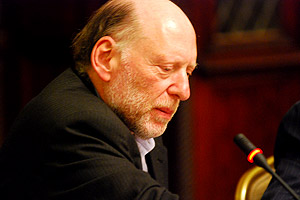
GITLIN: Well, my view is that it can’t be squared obviously, which raises a very interesting question about the nature of culture-war positions, which is, do the cultural conservatives mean it? I’ve wondered this also. It seemed to me that if you actually, seriously believe that from conception on there is a human life there, then Palin is right. An exception for rape and incest is absurd. It’s still murder. And actually her answer to Katie Couric on that, I thought, was actually one of her better moments. She said, basically – I can’t remember what her words were exactly –well, you know, horrible things happen and one has to side with life. That’s a stirring statement to which I don’t take any objection whatsoever.
But I’ve also wondered for years about the position that abortion is murder. If you don’t say, put the mothers, the women in jail, what are you saying? It’s murder but we’re not going to punish it? I don’t get it. And this is why I say that. I think that such positions are symbolic. It’s not what one will do – she also made a point of saying that one of her best friends was a lesbian, which I don’t question in the slightest. But then what does it mean when you say that this is a flagrantly and uniquely sinful activity, homosexual activity. What does it mean? Well, okay, I’m taking my stand but don’t actually expect me to do anything about it. And I think this is a conundrum.
LUGO: Anything to add to that, Yuval?
LEVIN: Yeah, first of all, I wonder if you could find any pro-lifer who would say to you that they think that women should be put in jail when they have abortions.
GITLIN: Well, why not?
LEVIN: You certainly wouldn’t find any pro-life bill that’s ever been proposed that says that women should be put in jail if they have an abortion.
GITLIN: It’s murder.
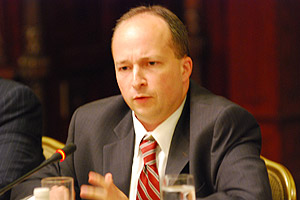
LEVIN: And the question of why not is a question again of prudence, of living in the real world. The fact is, we do draw distinctions all the time between different kinds of crimes and different kinds of circumstances. You get a much higher jail sentence for killing a mailman than you do for killing somebody who doesn’t work for the federal government. How does that make any sense? Well, it makes sense because there are other responsibilities; there are other things to think about when you make a law.
And one of the things to think about is a practical question of – given a society that is deeply divided on an issue – how do you move it in the right direction? You can’t simply think: if I made all the laws and I were a dictator, what would I do? And even then, if you did think about that, it probably wouldn’t be the best thing in the world to say to people that every act of murder or every act of killing is exactly the same as every other. We live in a society where the question of abortion for people who are opposed to abortion and who believe that life begins at conception – as I assure you pro-lifers do believe, not symbolically but really – the challenge is to persuade other people. We live in a democracy. The challenge is not to force anybody to do anything; it is to persuade somebody to do something.
And the fact is, you persuade people to do what you believe is right by showing them that it is also sensible in the world that they live in, in a world of difficult choices, of difficult circumstances, of complicated crises that people find in their own lives every day. Human beings are not just walking syllogisms that say: I believe x, therefore I must believe that the response to x must be y in every case. And therefore, this must be the law. Politics never works this way and law never works this way, and especially not in a democracy.
And so, I think faced with the question of how do we improve the situation, how do we get beyond an America where 3,000 abortions happen every day? The answer to that is that you have to do it step by step. And you have to do it by persuading people who don’t begin by agreeing with everything that you believe on this question. And that means being prudent.
If you think about it, the pro-lifers in the abortion debate are very moderate. Given that they do believe that abortion is murder and that it happens 3,000 times a day, they are very moderate. They believe in America even more. They believe that it’s possible to find the right kind of solution to this problem.
They believe that this country can in the end, as it’s solved so many other moral crises – like slavery, like civil rights questions – they believe we can get there. But to get there you have to first believe in America. You have to first persuade your neighbors. And that means going step by step. And that means not being a radical. And I don’t think it makes sense to fault them for not being extremists or to fault them for not taking the absolute furthest possible position they could possibly take given the premises they begin with. They don’t do that, and I think that reflects well on them.
LUGO: Okay, we could stay on that for a while. But we’ve got to move to Kevin here. I’ve got quite a lineup here. Maybe we can come back to it, Todd. Go ahead, Kevin.
KEVIN ECKSTROM, RELIGION NEWS SERVICE: And this is sort of a follow-up to what E.J. was saying about this being possibly a 1932 election and not a 1928 election. Given everything that’s happened in the last couple weeks, is it possible that the traditional culture war issues that we’ve always sort of talked about – abortion, gay marriage, the hot potatoes – that they won’t matter as much as people’s stock portfolios and 401(k)s. And the issues that have always been associated with religion, the moral culture war issues, won’t matter as much this year as economics. And so, I guess the question I’m trying to get to is, does religion even matter in this election, maybe the way we thought it did three or six months ago? Have things changed so much economically that it’s now a purely economic election?
GITLIN: As you know, there’s even a dispute as to how significant the gay marriage issue played out in ’04. There are serious – there’s a fight among political scientists, I gather. But there’s at least a strong case to be made that whatever benefit the Republicans got from waves of unexpected turnout in states like Ohio where there were gay marriage measures on the ballot was cancelled out, maybe and then some, by an enlarged turnout of those who took the other position. There were those who turned out to vote especially because they thought this – an act of cultural aggression to oppose gay marriage constitutionally – went too far. So that may have been a wash after all.
But certainly, what you’re calling the traditional issues of culture war cleavage – I mean, gay marriage as an issue can hardly be called traditional because it wasn’t even on the horizon eight years ago. So, there’s no doubt but that those issues are dampened. But around the edges, if it’s a close election, they’ll matter. Haven’t a couple of bishops proclaimed they would not admit Biden to communion? So as happened with Kerry –
UNIDENTIFIED: Nine, nine of them.
GITLIN: Nine of them. And how many did the same with Kerry?
UNIDENTIFIED: Fewer.
GITLIN: Fewer. Okay, well, that’s interesting. But it remains to be seen. I mean, it’s an interesting question to ask people in Scranton who are pro-life Catholic Democrats. Here it is. Biden is the hometown boy. Sen. Bob Casey is a hometown boy. How is that going to play out? I mean, that is an empirical question. I really don’t know.
LUGO: Yuval?
LEVIN: I agree with that entirely. I think it’s going to be an election where it matters less. But if it’s a close election, then every little bit counts. If it’s not, then of course the reason it won’t be, won’t be cultural; it would be economic. I mean, I think this certainly looks to be an election where the pocketbook issues matter quite a lot.

JANE LITTLE, BBC: Actually, Kevin just asked my question, so thank you, Kevin. But I’ll make an observation. It was really to tie it in with the rest of the world. The rest of the world is quaking in its boots right now with this economic crisis. I mean, we just had another bank nationalized in Britain this week. And even we in Britain do not like to use the word nationalization anymore. And so, there’s a sense that this election is hugely important, and that never has experience and qualifications mattered as much. Basically, they want another Churchill. That’s what’s being written a lot in the English papers. We need Churchill.
So there’s a bemusement that the culture wars – that we’re even having this debate about how relevant it still is. Surely, it’s about houses and jobs and the future of the world. So I think my question was going to be about how much it is still relevant in this debate. But I wonder if we could see a reframing of the values issues out of this because of the economic crisis. We’re going to see potentially a lot more poverty; people losing their homes. It’s going to favor the Jim Wallis side of the argument when it comes to values issues. We might see more people reframing the way they vote in terms of cultural values. But it’s going to be a lot less about abortion, gay marriage.
LUGO: What about that, Todd? You said that we have gone through – I mean, the culture wars are always with us. But they take on specific manifestations depending on the issues. Jane is suggesting that maybe we’re at a turning point in the way we define culture wars in the popular consciousness. What about that?
GITLIN: Well, I like the way you framed it because in fact, what is at stake in big economic fights are value questions. Main Street v. Wall Street, although it’s a bumper-sticker version, is a value-laden way of framing – I don’t have to go into detail. I think it’s self-evident that it’s a question of who is valued. Whose pain hurts – where do we administer remedy?
And to couch that as a value debate is something the Republicans have done quite successfully and the Democrats have been rather lame about it. And this is actually a striking opportunity for them, I think, to restate this not as a technocratic matter of how one handles debt – what kinds of financial instruments there are – but to say that there is this deep choice. I think Obama’s done it a bit when he’s slapped away trickle-down ideas. The knock on trickle-down, which Bill Clinton was also quite good at, is a value knock. It’s not saying we have different solutions, different proofs of the same theorem. It’s saying there is this cleavage. And you should be on the side of what today we all call the middle class.
LUGO: And I think, just observing the scene, there has been an effort on the part of Democrats to enlarge the moral values debate – including, very explicitly, the religious values debate – to include issues beyond what you call the stock-in-trade culture war issues. Beyond abortion and gay marriage, they want to include things like poverty and global warming and issues like that. I think there has been a concerted effort; and if there hasn’t been – E.J. will correct me right away. But Yuval, why don’t you tell me –
LEVIN: I agree, there has been an effort, and I think it hasn’t been terribly successful so far. They probably haven’t found the language to even try to make it terribly successful so far. But I think the effort probably won’t quite work in the end because it’s founded in the notion that the concern about issues and gay marriage and others is symbolic – which I think is not the case. It’s a genuine, deep concern. I don’t think that the economic situation fundamentally reshapes that; it can easily change the subject for a while.
But, on the other hand, the kind of bailout that we are seeing passed this week – and that just about the tops of both parties certainly agree to – is the epitome of trickle-down economics. I mean, it’s a treatment being given only to the top of the pyramid, with the understanding that what is done at the top matters immensely at the bottom. I mean that’s sort of the essence of what Bill Clinton and others argued against in the ’90s. It’s also the essence, of course, of what conservative economists have argued against since the beginning of time: a kind of huge government intervention buying private debt and all the rest of it.
So I don’t think anybody comes out of this with a lot of new weapons in their economic arsenals. Everybody’s doing what they’ve always said we shouldn’t do, because apparently we have to. I don’t think it fundamentally – in the long term – reshapes these debates. I think America is going to continue to be kind of amusing to the rest of the world in this regard, but I think for good reasons.
LITTLE: I don’t think it’s amusing to the rest of the world right now.
LEVIN: Well, that was your word. I think that folks in Europe have often had trouble understanding the way we argue these issues and even the reasons why we argue these issues. There’s a kind of cultural consensus on them – not an easy one – but that’s settled over the past few decades, and that certainly hasn’t happened here.
LUGO: Speaking of the rest of the world, Daniel, you’re up for what to this old-timer is still The Manchester Guardian.

DANIEL NASAW, THE GUARDIAN: Thanks, we moved to London in the ’70s.
(Laughter.)
LUGO: As I said, for this old-timer.
NASAW: In 1968, it was clear that Nixon was stoking resentment against the shaggy long-hairs of the new left and blacks in Detroit and Newark, and he did this explicitly in his advertising. I can’t help but wonder if when Palin goes on Hugh Hewitt and talks about, the elites may not like me because I’m from this different background, is she railing against some straw man? I think that she’s stoking resentment against whomever it’s targeted at, because it’s not explicit. I wonder what the panel thinks about this? Who is the target of this? Who is the “they”?
GITLIN: Well, I think this is a if-the-shoe-fits-wear-it – or whatever the expression is – sort of accusation. I understand why it serves her to see the reaction to her as rank prejudice. I don’t think it is that in the slightest. If Obama had happened to be raised – as his mother was – in a small town in Kansas and he had turned out to be Obama, I don’t think anybody who likes Obama now would like him any less because he came from a small town. So I think that’s actually a fake and it’s a spurious – it’s an aggressive defense, which saves her from having to talk about knowledge. Every time she tries to talk about knowledge, she lies. Katie Couric asked her, you know, what do you read? And she said, I read all of them. Come on! The problem is not that she’s from a small town. I didn’t think that from the beginning at all.
LUGO: Earlier, Yuval, you said that the elites are those people that you don’t like. So for the people for whom Palin resonates, who are the “they” – who are they filling in? You know, how are they filling in that blank when they hear her talk about that?
LEVIN: I think to some extent the shoe does fit, right? The elites are – the people she has in mind, and I don’t want to simply say, the elite are, but the people that she has in mind are – the folks who populate the press and the universities. It’s not fair to say they really look down on small towns; I don’t know what that really means. I’m sure a lot of them are from small towns. She refers to people who look down on a woman who doesn’t have the kind of educational credentials that they do, who’s held a lot of jobs, who raised five kids, who is pro-life, who is clearly religious and has attitudes that they can easily consider backwards.
I think we saw a lot of that. It expressed itself in resentment early on in the kind of coverage that she got and the kinds of things people were readily willing to believe about her – to assume about her. You know, we know a lot of them here; some of us are probably in the category pretty comfortably, and I don’t think it takes a terribly huge amount of imagination to see that what she has in mind is a kind of cosmopolitanism. This is opposed to what she takes to be her own small-town attitudes. A lot of that is myth, but so is a lot of the rest of our lives.
GITLIN: This goes back to the question of elites and elitists. Her speech was an elitist speech. She believes that people from her background are the real America. I guess that means we’re not; we’re from the fake America. This is a classic move in the rhetoric of polarizing smugness. Except in this case, the tables are turned. So people with higher degrees are really subsidiary. We should be ruled by them. If it happens that the residents of small towns add up to 16 percent of the American population – truth, I looked and that is the percentage – the turning of the tables makes imminent sense, but it’s intellectually threadbare.
LEVIN: Isn’t that what makes it a populist speech?
GITLIN: No, because she claimed not that they outnumber us but that they’re better than us: they’re more ethical; they know how to live; their families are better; they are finer people.

KATHY SLOBOGIN, CNN: And in defense of my profession, I have to say I’m part of the dark blot on the history of journalism, since we did a documentary on both Sarah Palin and Joe Biden. We examined their records and some of the things you’ve talked about – which I believe is a function of a free press.
My question to all of you, but maybe more to E.J. than anyone else is this: do we think that we’re coming into a time when perhaps it will dawn on political activists and political parties that the culture wars are no longer an electoral asset, but perhaps a liability? In other words, I mean they energize and mobilize the fringes on both sides of the spectrum, but one could argue that those are safely in the base. The independents – the unwashed middle – that’s the target that the parties are vying for. Is it possible that they’re being turned off by the culture wars because of their polarizing effect, and they just want to get on with it and solve the country’s problems?
LUGO: And Kathy, just to clarify, you mean the culture war in the more narrow sense in which we’ve been talking about it and not in Todd’s broader sense?
SLOBOGIN: Exactly.
LUGO: E.J., you wanted to get in with a short intervention, so there you go – she set you up.
DIONNE: Thank you, Kathy. I think the Democrats, and Obama in particular, have already made that choice. You know I’ve joked before that the Democrats discovered God in the 2004 exit polls; and since God can be discovered anywhere, that’s just fine. I think when you watch Obama, for example –Yuval said he’s the most radically pro-abortion state senator – but in fact his own language on abortion has been quite different than that. He’s actually talked about abortion reduction some and fairly weak, but nonetheless, significant language got into the Democratic platform. So I think Democrats are trying to push away the culture war. And if the Republicans lose this election, I think they’re going to revisit whether culture war politics is as functional.
I wanted to get in just to make two quick points. One is: Yuval suggested that a lot of the folks trying to change the religious conversation are doing so premised on the idea that issues such as abortion are purely symbolic. And actually I think that’s not true. In fact, I think the distinction is between those who only talk about the right to life from conception to birth and those who talk about it from conception to natural death. And economic justice, war and peace, and all those things matter a lot in that big period between birth and death. And in fact one of the reasons I’ve actually admired your work is you’re a conservative who’s actually seen some of the links between economics and the life issues.
But my question was – I was grateful that Todd raised race, because whenever we have these discussions, we don’t really want to talk about race, or the extent to which the racial divisions of the 1960s are a big part of the culture war. A lot of white southerners became Republican in the ’60s, because of civil rights, not in the ’80s because of religious issues; they may have had their new loyalties reinforced by religion. So I’d like each of you to reflect a little more on this racial question that Todd raised; it’s clearly present in this election in a way that it hasn’t been ever before. And how does our national argument about race relate to this other cultural and religious argument that we have?
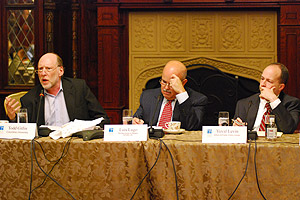
LUGO: Good question, E.J. That will have to be the last one because we’re just about out of time. So Yuval why don’t you go first and then we’ll have Todd wrap it up for us.
LEVIN: Sure. First, briefly, to Kathy’s question, I think it remains the case that the culture war issues as you define them are much more helpful to Republicans than they are to Democrats, and I don’t think that’s going away. It’s still just much better to be a pro-life politician in America than a pro-choice politician, as a matter of just electoral politics. And so it is that side of the argument that tends to highlight the issue and that tends to run on it. At this point, that doesn’t seem to be changing, and so I doubt the parties will change their attitudes about it. But it could change – it has changed in our history over time.
To E.J.’s question, I think – and I don’t have a lot of data here and so you should take it as two cents that are not worth any more than your two cents – that Barack Obama is helped a lot more by the fact of his race than he is hurt by it, with people from both parties. That is, I think there really is a sense that it would be a good thing to have a black president, and it’s fairly widely shared. Obviously, there are also people who would think it would be a bad thing, and who are inclined against him for that reason. I think that number is fairly small, and that the influence it will have on this election is fairly small.
I also don’t think most people will vote for him – or any large number of people will vote for him – because he is black. That the fact that race has not been a huge explicit issue in this election reflects well on our country. And, you know, obviously things would have been very different if there had been a black nominee for president even 10 years ago, certainly 20 years ago. To me, that seems like a good sign. But again, that seems like an impression, and I can’t prove that.
LUGO: Todd, are we beyond race as a culture-defining issue – culture war-defining issue?
GITLIN: Race is always a shadow. And it’s a tribute – I agree with Yuval – it’s something of a collective maturation that it’s in the recesses rather than out front. But our assessments, regardless of our politics, of what mattered and what the temperature of America is will depend on the outcome. The outcome will send a lot of people into high-theorizing mode, and it will be for good reason. If it’s a narrow election – as I think E.J. said before – then everything counts big. And those who believe that if only the campaign had been pursued more in their direction will be invigorated. And, you know, there will be a lot of grousing and recrimination on whichever side loses.
I think the Republicans are heading for a cataclysm if they lose reasonably badly. They have been able, for a variety of reasons, to defer the cracks in their own coalition, and the reckoning may be nigh. But again, that all depends on outcomes. Whether race is more an impediment now than not will also depend upon many things about turnout and so on. So I guess I end inconclusively, on an agnostic note.
(Laughter.)
LUGO: I’ve gone through this whole event, actually, afraid that I’d refer to you as Todd Palin – (laughter) – so I’m delighted that I didn’t make that mistake. Thank you, Todd Gitlin, thank you Yuval Levin, and to all of you for coming.
Please note corrections to the following factual inaccuracies in the written transcript, video and audio:
* The 2007 Pew Social Trends survey found that 53% of Republicans and 56% of white evangelicals thought that mothers working outside the home was a bad thing.
This written transcript has been edited for clarity, spelling, grammar and accuracy by Cheryl Jackson.


